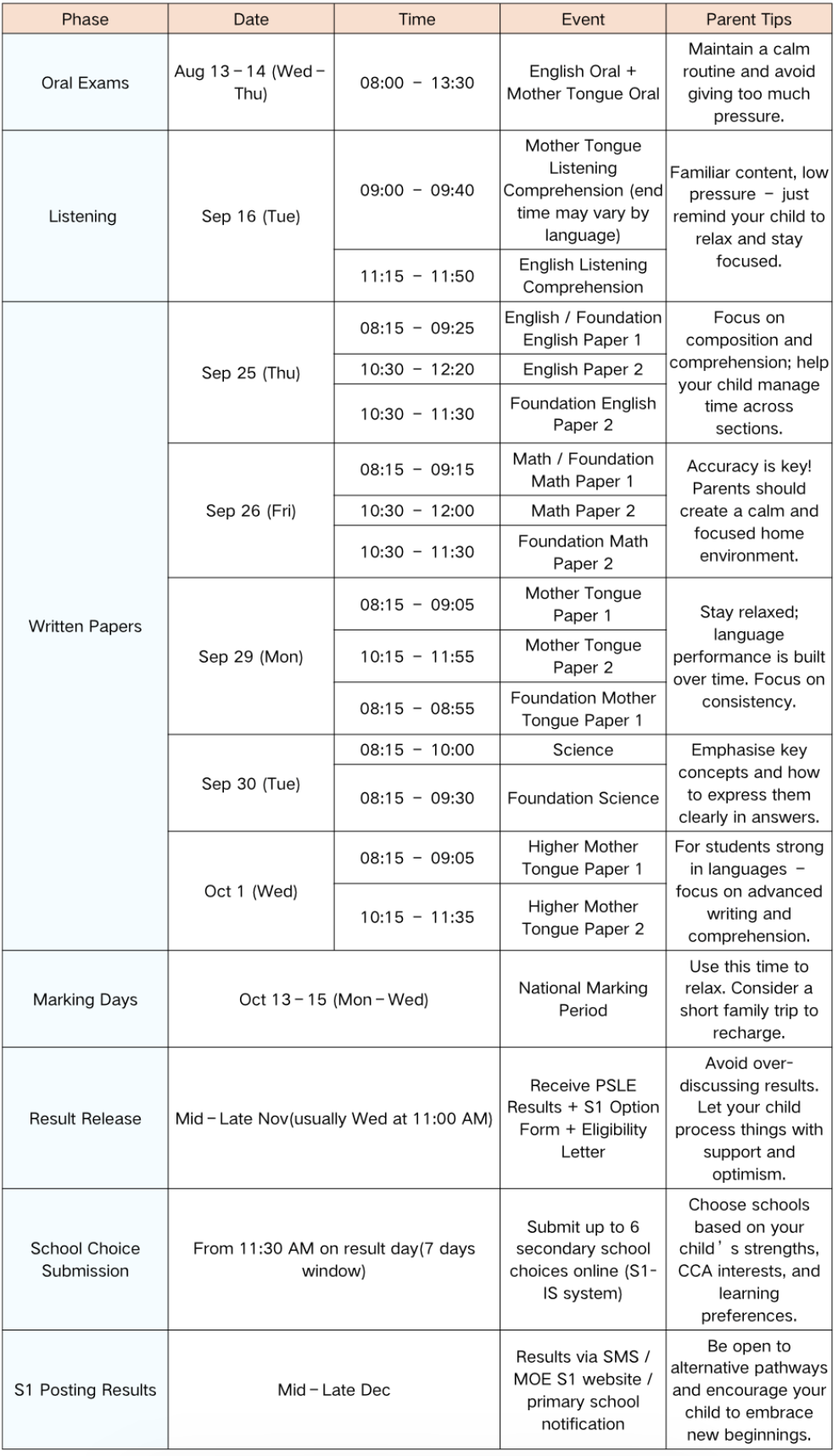|
|
本帖最后由 Nora老师 于 2025-6-20 20:57 编辑
PSLE Countdown! Key Dates + Math Scoring Tips Every Parent Should Know!
With just 3 months left before the 2025 PSLE written exams in September, we’re officially in the final sprint phase.
For Primary 6 students, this is a golden opportunity to close knowledge gaps and sharpen exam skills.
For parents, the next few months are just as crucial — how do you plan revision effectively without overwhelming your child?
This article walks you through:
- The key dates for PSLE exams, results, and secondary school posting
- Targeted revision strategies based on your child’s current Math performance
Let’s get started.
PSLE 2025 Timeline — Save These Dates!
Here’s a breakdown of key PSLE milestones every parent should know. Mark your calendar and plan ahead!

Parent Tip: Avoid adding pressure. Your calm support matters more than extra worksheets. After the exams, consider a short break or family trip to help your child reset before results are released.
How to Boost PSLE Math in the Final 3 Months
Among all subjects, Math is where students can most easily pull ahead in the final stretch.
Unlike English or Chinese, which require long-term exposure, Math performance can improve significantly through targeted practice and better exam techniques.
So how should you revise based on your child’s current level? Here’s what our teaching team recommends:
1. If your child is scoring AL3 or below:
Focus on mastering the basics with PSLE past-year papers
If your child hasn’t started doing Past 10 Years' PSLE Math Exam Papers, now’s the time!
These 10-year papers are packed with high-frequency topics and exam trends — making them the most cost-effective revision material during this phase.
Practice Plan:
- 1 full Paper 1 daily (timed: 2 mins per question max)
- 2 structured Paper 2 questions per day
- Record every mistake, identify the reason, and rewrite the correct steps
- Ensure full marks on all low–medium difficulty questions
2. If your child is scoring AL1–AL2:
Move on to Top School Prelim Papers
For high-achieving students who want to stay ahead, the real challenge lies in tackling tough, non-routine problems.
Top schools like Nanyang, Raffles, and SCGS often include creative and challenging questions in their Prelims.
These questions go beyond PSLE in difficulty, but help train advanced reasoning and flexible problem-solving skills— essential for handling the final few questions in Paper 2.
Practice Plan:
- 1 full prelim paper per week
- Identify recurring question types and problem-solving strategies
- Discuss alternative solutions with teachers or peers
- Refer to our curated Prelim Qn bank with 30 sets of high-level questions

The goal is to build “breakthrough thinking” — to turn unfamiliar questions into something manageable by recalling known models.
3. Don’t Skip This: Mock Exams in the Final 4 Weeks
Doing many practice questions ≠ being ready for the real exam.
What truly determines success is whether your child is mentally and physically prepared for the actual exam flow.
Mock exams help simulate this:
a. Familiarity with time pacing (Paper 1: 1 hr, Paper 2: 1.5 hrs)
b. Practice maintaining attention and energy through full papers
c. Building calm, confident exam-day habits
Practice Plan:
- 1–2 full mock papers per week starting 4 weeks before PSLE
- Simulate exam conditions strictly: no checking answers, no distractions, timed sessions only
- After each mock: do full correction + reflect on pacing and question order
The goal is not perfection, but consistency under pressure.
By the time your child walks into the real PSLE, it should feel like “just another practice”.
Free Resources for Parents
Want access to more PSLE Math materials and expert help?
Our team is offering free support for parents this season, including:
- PSLE past-year papers (10 years)
- Live Q&A with experienced Math tutor Mr. Ma Zhangchi
- Updates on latest PSLE policies and math revision tips
Contact Mr. Ma directly or join our WhatsApp group (QR code below).

|
|